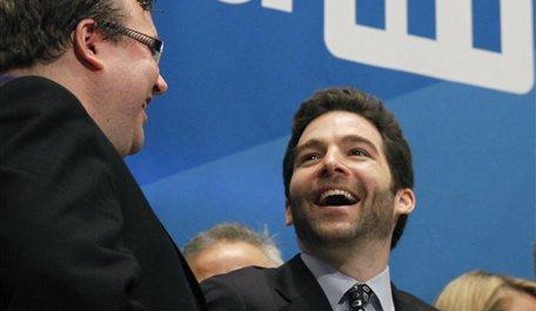Yesterday, Barack Obama held his first press conference in over 10 months in order to change the narrative of a passive and disinterested White House response to the Gulf oil spill. Obama assured the press corps that “from the moment this disaster began, the federal government has been in charge of the response effort.” That claim caught the attention of Sarah Palin, who launched a series of questions regarding that claim and criticized the Obama administration’s response to the crisis:
Nearly 40 days in, our President finally addressed the American people’s growing concerns about the Gulf Coast oil spill. Listening to today’s press conference, you’d think the administration has been working with single-minded focus on the Gulf gusher since the start of the disaster. In reality, their focus has been anything but singular to help solve this monumental problem.
If the President really was fully focused on this issue from day one, why did it take nine whole days before the administration asked the Department of Defense for help in deploying equipment needed for the extreme depth spill site?
Why was the expert group assembled by Energy Commissioner Steven Chu only set up three weeks after the start of this disaster?
Why was Governor Jindal forced more than a month after the start of the disaster to go on national television to beg for materials needed to tackle the oil spill and for federal approval to build offshore sand barriers that are imperative to protect his state’s coastline?
Why was no mention of the spill made by our President for days on end while Americans waited to hear if he grasped the import of his leadership on this energy issue?
Why have several countries and competent organizations who offered help or expertise in dealing with the spill not even received a response back from the Unified Area Command to this day?
In my previous post, I warned about the danger of overstatement and hyperbole. Obama would have been wise to claim ownership of the disaster response now — it was obvious that he owned it whether he acknowledged it or not — but owning the entire response leaves him vulnerable to exactly this kind of criticism. If Obama seeks to reassure people that the White House will handle the crisis well from this point forward, defending the relative inaction of the first couple of weeks as an argument for confidence is very misguided.
And of course, that lack of inaction means people will wonder what had Obama’s attention at the time. Palin reminds us, and also notes that Obama had authority from the beginning to take control of the response:
The 1990 Oil Pollution Act was drafted in response to the Exxon-Valdez spill in my home state. It created new procedures for offshore cleanups, specifically putting the federal government in charge of such operations. The President should have used the authority granted by the OPA – immediately – to take control of the situation. That is a big part of what the OPA is for – to designate who is in charge so finger-pointing won’t disrupt efforts to just “plug the d#*! hole.” But instead of immediately engaging with this crisis, our President chose to spend precious time on political pet causes like haranguing the state of Arizona for doing what he himself was supposed to do – secure the nation’s border. He also spent much time fundraising and politicking for liberal candidates and causes while we waited for him to grasp the enormity of the Gulf spill.
Arizona’s SB1070 was signed into law on April 23rd. The Gulf disaster began on April 20th. Until the last week or so, which of these got more public attention from Obama? The campaigning for candidates is just part of political life, but the choice of issues for presidential outrage is rather telling. Obama seemed much more exercised over Arizona’s efforts to enforce existing immigration law than with the oil spill that is entirely his jurisdiction — at least until the national media began howling over his apparent indifference.
Obama tried offering a “buck stops here” moment in his final answer to the press corps yesterday, but Palin isn’t buying it:
Now that the American people are calling him out on his lack of engagement with this disaster, the buck-passing is in full swing – and, unbelievably, his administration is still looking to blame his predecessor. Amazingly, even those of us who support energy independence for America are the brunt of some buck-passing.
He suggested today that a “culture of corruption” at the U.S. Minerals Management Service (MMS) was solely the previous administration’s responsibility and that the failure of the inspection system was a failure of that administration. That is false. The MMS has been his responsibility since January 20, 2009.
The MMS director who resigned today, Elizabeth Birnbaum, was appointed by his administration. And the most recent inspection of the oil rig took place a mere 10 days before the explosion –also very much on his watch, not President Bush’s.
This is the point I made yesterday, and which at least one reporter questioned during the presser. If the MMS was so corrupt, why did Obama authorize the expansion of off-shore drilling less than two months ago? Didn’t Salazar and Birnbaum think to check whether MMS was up to the task? They had fourteen months prior to that expansion to figure it out, but now suddenly have discovered alleged widespread corruption only after a disaster struck.
The entire response to the Gulf spill suggests a systemic level of incompetence, starting from the Oval Office and cascading downward through the executive branch. These are questions that Obama should have answered yesterday, and which he should be pressed to answer every day until we get the transparency Obama promised.








Join the conversation as a VIP Member